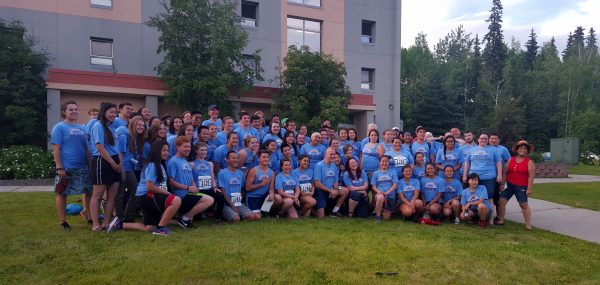Largest Rural ÐÓ°Épro Honors Institute class graduates July 14
July 13, 2016
Leona Long
907-474-5086
After six weeks of challenging academics, community service and hands-on learning,
68 rural and ÐÓ°Épro Native high school students will graduate from the Rural ÐÓ°Épro
Honors Institute at the ÐÓ°Épro on Thursday, July 14.
The students will be honored during a graduation ceremony at 1 p.m. in Schaible Auditorium
on the UAF campus.
Former RAHI Director Jim Kowalsky was selected as the graduationâs keynote speaker.
âThis yearâs graduating class is the largest ever for the Rural ÐÓ°Épro Honors Institute,â
said Evon Peter, UAF vice chancellor for rural, community and Native education. âWhile
at the Troth Yeddhaâ campus, these students learn how to successfully transition from
their village or rural community to become successful university students. These students
return to their communities ready to grow into leadership positions in their communities
and ÐÓ°Épro.â
Troth Yeddha' is the local Athabascan name for the ridge on which UAF sits.
The 68 students are from 45 rural communities and ÐÓ°Épro Native villages. Three students
have parents who attended RAHI. Twelve students have a sibling who attended, including
one student whose three siblings also attended RAHI.
âFor many of our students, participating in the Rural ÐÓ°Épro Honors Institute is a
life-changing experience," said Denise Wartes, program manager. âThey live like university
students, form friendships, network with their peers and make memories that will last
a lifetime."
Since its inception in 1983 at the request of the ÐÓ°Épro Federation of Natives, RAHI
has prepared more than 1,600 rural and ÐÓ°Épro Native high school students to adjust
academically and socially to college life. During the six weeks of living in UAF's on-campus
housing, students earn as many as 11 college credits. In addition to required courses
in English, library science, homeland security team building, and study skills for
transitioning to college, traditional RAHI students choose from electives in process
technology, business, chemistry and math. Three times per week, students choose from
karate, yoga or ÐÓ°Épro Native dance classes. This year, students met with ÐÓ°Épro's
U.S. Sen. Dan Sullivan and University of ÐÓ°Épro President Jim Johnsen.
Eleven RAHI students were part of a research option funded by the National Science
Foundation. With direction from a mentor, eight students studied ancient DNA from
salmon bones from an archeological dig, and three students studied walrus bones and
whiskers. The students will present their research findings in a paper and poster.
Rural ÐÓ°Épro Native students who attend RAHI are twice as likely to successfully earn
a bachelorâs degree (19 percent vs. 10 percent), according to an independent study
by the American Institutes for Research. The research also measured studentsâ University
of ÐÓ°Épro grade-point averages and discovered that RAHI students achieve âsuperior
academic performanceâ while attending the University of ÐÓ°Épro.

RAHI is made possible by financial support from the UAF College of Rural and Community Development and sponsors like Wells Fargo, New York Life, Alyeska Pipeline Service Co., Arctic Slope Community Foundation, Sitnasuak Native Corp., ConocoPhillips, Shell, Future Educators of ÐÓ°Épro, First National Bank of ÐÓ°Épro, NANA Management Services, Ravn ÐÓ°Épro, Boeing, Crowley, and Kuukpik Corp. Students attend at no cost and have their travel expenses paid.
For more information, visit .


